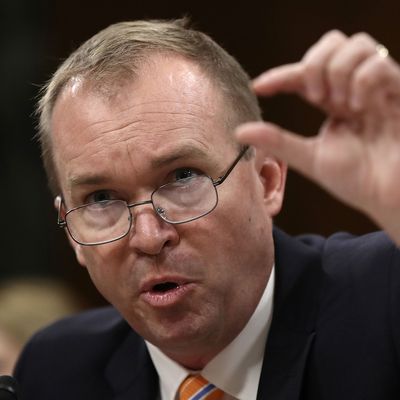
White House budget director Mick Mulvaney is furious with the Congressional Budget Office. Inconveniently for Mulvaney, but quite intuitively, the CBO estimates that the Republican plan to eliminate a trillion dollars in subsidies for health-insurance coverage will result in a very large number of people no longer being able to obtain health insurance. This latest provocation is enough for Mulvaney to vow, in an interview with the conservative Washington Examiner, that the CBO should no longer be taken seriously as a budget forecaster.
Mulvaney charges the CBO with hopeless liberal bias. “We’re hearing now that the person in charge of the Affordable Health Care Act methodology is an alum of the Hillarycare program in the 1990s who was brought in by Democrats to score the ACA,” he says. (In fact, the CBO’s 2010 forecast of the ACA proved highly accurate.) Mulvaney suggests that Congress stop paying so much attention to the biased liberal CBO.
Instead, he proposes that any legislation should instead be measured by different groups of economists — the president’s own forecast would be one, partisan think tanks’ would be others — and Congress could pick which numbers to believe:
“I would do my own studies here at OMB as to what the cost and benefits of that reg would be,” he said. “And other folks would do their studies from the outside. And those would come with their natural biases. The Heritage Foundation comes in and says it’s going to cost a lot. Brookings comes in or the Center for American Progress says the benefits would be great. You and I and other lawmakers can sit down and say, ‘Okay, we think that this is where it is, and we’ll make our decisions based upon that.’”
So Mulvaney’s ideal system would have Congress stop relying on the CBO and start listening to forecasts cooked up people like Mulvaney.
A sense of what the budget director has in mind comes from another portion of the same interview, which, fortunately for Mulvaney’s dignity, the Examiner has published in a separate article. The backstory to this portion of the interview is that Mulvaney wrote a budget that assumes Trump’s tax policies will increase revenue by $2 trillion. Given that Trump is not proposing anything like this, this is either an absurdly simply math error (if you make a generous assumption) or a grotesque lie (if you don’t). In his interview, Mulvaney cops to “lie” over “childish error.”
“We assumed for purposes of the budget that whatever we did would be paid for with the offsets by way of the exemptions, the loopholes, the deductions, so forth. We just made an assumption,” he explains. But that assumption is not accurate. Indeed, Mulvaney concedes that it’s not accurate. “That is not an indication of what our preference is, as far as tax policy. In fact, several folks in the White House have said they are interested in pushing a larger tax bill that would add to the deficit,” he admits.
So Mulvaney decided that, to make Trump’s budget add up, he would assume that it consisted of different policies than the ones Trump is proposing. He is not even hiding this. Here is possibly the most astonishing sentence ever uttered by a government budget official: “I wouldn’t take what’s in the budget as indicative of what our proposals are.”
What? Of course the budget is indicative of what their proposals are. That’s what a budget is. It is a document that records the president’s fiscal proposals. You can’t just release a budget containing a bunch of proposals, boast that the budget fulfills some goal, like eliminating the deficit, and then casually admit that the president doesn’t endorse the policies in it.
These comments tell you all you need to know about Mulvaney’s dismissal of the CBO. Forecasting budgets, like forecasting anything, inherently involves uncertainty. The CBO is not going to be perfect. But it does take its nonpartisanship seriously (the agency dealt a serious and possibly even fatal blow to Bill Clinton’s health-care plans in 1993). And it does consist of competent professional forecasters who at minimum are trying to produce accurate forecasts. Mulvaney proposes to ignore those numbers and instead rely on numbers made up by people who don’t even pretend they’re real.






























